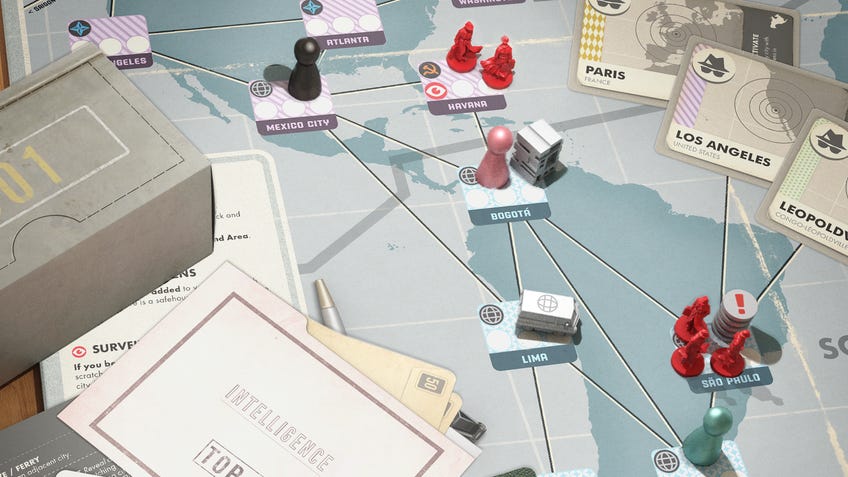Pandemic Legacy: Season 0 board game review (spoiler-free) - fantastic finale to an outstanding tabletop trilogy
Tinkered, Tailored, Bolder Bye.
For all its boxes stuffed with secrets, card-ripping permanence and what-comes-next story about humanity sliding toward apocalypse, perhaps the biggest surprise the Pandemic Legacy series has pulled off is getting us to care about its world.
Note: This review of Pandemic Legacy: Season 0 is spoiler-free. While we will be discussing our experience of playing the game from start to end, there will be no specific gameplay or story details mentioned beyond those available in the opening prologue game. There is similar spoiler-free discussion of Pandemic Legacy: Season 1 and Season 2.
The original Pandemic was a masterclass in rules reflecting theme. Matt Leacock’s ingenious 2008 co-op hit felt vaguely simulationist as its four diseases piled up on cities, eventually spilling out into neighbouring locations. Epidemic cards - spread with just enough fairness but unpredictability through the player cards required to cure the infections - were nail-biting moments that kept players from ever feeling completely on top of things, suddenly erupting a card from the bottom of the location deck into a three-cube hotspot of potential disaster. It was tense, challenging and satisfying (with a few, very rare exceptions). But it was also generic: the diseases were colours, the characters job titles and the world little more than a flat piece of card.
In Pandemic, you cared whether you won or lost. In Pandemic Legacy, winning wasn’t enough - you cared about the state you left things in.
Pandemic Legacy changed that. With the stroke of a pen and a book of stickers, characters became people, with names, stories and the potential to suffer - and even succumb. Permanently. Cities and regions could still be blighted by infection, but now the changing board displayed a lasting record of your decisions, successes and failures. Other choices would see you tear up and customise cards, forever altering your copy of the game. The world evolved, and your group along with it. In Pandemic, you cared whether you won or lost, sweeping pieces off the board as soon as the world’s fate was sealed. In Pandemic Legacy, winning wasn’t enough - you cared about the state you left things in, and some things couldn’t be swept away.
The first season of Pandemic Legacy - rightly proclaimed as one of the best board games ever made upon its release in 2015 - was followed by the even more daring Season 2 in 2017. Set generations later (a neat way of bringing the slightly divergent player-dictated endings of Season 1 back to a single thread), it flipped Pandemic’s familiar cube-removal puzzle on its head. Rather than react to beat back the tide of infection, players now had to get ahead of the virus, pre-emptively delivering dwindling supplies to safeguard the scattered vestiges of humankind. At the same time, the focus shifted away from trying to save the world - already lost - to re-discovering what was left of it. The board wasn’t just reset but stripped bare, players having to uncover regions and establish their own routes across the map as they ventured out from their starting haven.
While still recognisably Pandemic at its core, Season 2 was a much more drastic remixing of the formula, showing Pandemic Legacy co-creators Leacock and Rob Daviau pushing story, gameplay and the gimmickry-cum-invention of the legacy format to new levels. Its experimentation and tougher difficulty meant a less consistent experience, for better or worse - some players decried it as inferior to the original, while others (myself included) found it even more groundbreaking and memorable. Either way, Season 2 did far more than pull the same stunt twice.
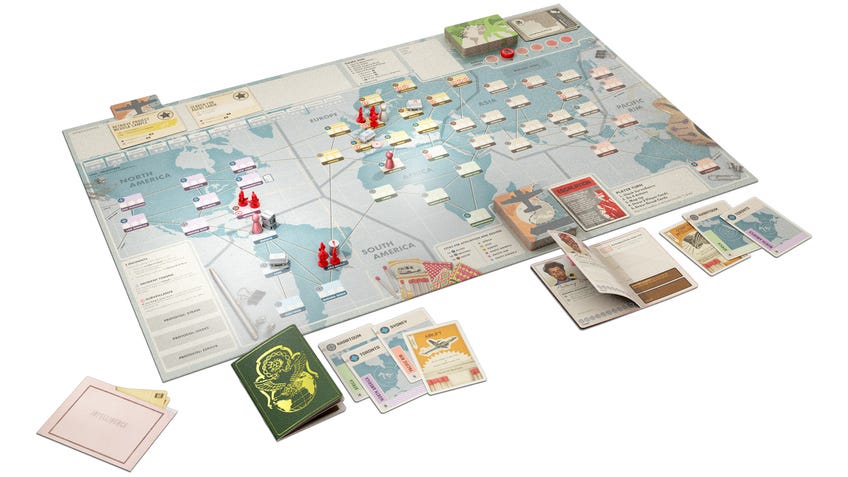
If you’re wondering why all this matters in a review about Pandemic Legacy: Season 0, it’s because Season 0 reflects the culmination of the Pandemic Legacy series, both narratively and mechanically. Where Season 2 saw Pandemic’s gameplay bent almost to the point of breaking, Season 0 is less explicitly bold with its reshaping of what came before. Instead, Daviau and Leacock work to flesh out the world of Pandemic with a game that is no less impressive and satisfying, taking the series in yet another new direction.
Much of that direction is backwards. Season 0, if you hadn’t guessed from the name, is a prequel, spanning the 12 months of 1962. It’s the height of the Cold War, and players’ characters are fresh-faced medical students thrust into a CIA plot to uncover a secret Soviet bioweapon codenamed Project MEDUSA before it’s unleashed - deliberately or otherwise - on the globe. You can probably see where this is going. Refreshingly - and perhaps auspiciously, given recent world events - Pandemic’s well-worn disease disaster largely takes a backseat to the engaging moment-to-moment espionage action.
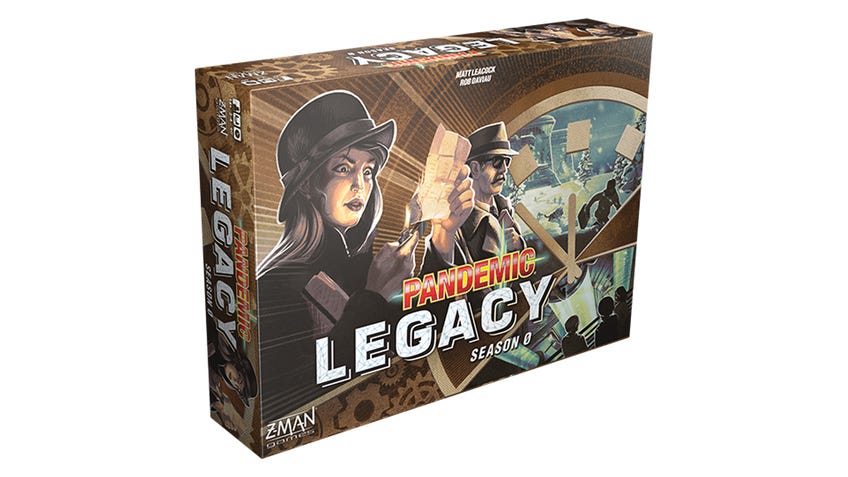
Replacing Pandemic’s cubes are attaché case-carrying Soviet agents, who gather in cities across the board and must be euphemistically ‘neutralised’. Rather than breaking out into neighbouring locations when a spot is overwhelmed, cards from the threat deck double as ‘incidents’. Incidents trigger specific effects in different parts of the world and raise a location’s surveillance - the likelihood of a character’s cover being blown. Exposure leads to randomised negative effects tracked by scratching off spots on a character’s sheet, all the way to an alias being burned and lost for good. Managing the growing number of red figures and navigating - or risking - enemy spies feels closer to the original Pandemic Legacy than Season 2’s subversive take on the gameplay (you’ll be right at home by the end of the prologue game if you’ve played any Pandemic before), but incident effects and surveillance introduce enough variety to make it reinvention rather than rehash.
Season 0's agents feel closer to the original Pandemic Legacy than Season 2’s subversive take on the core gameplay, but there's enough variety to make it reinvention rather than rehash.
The biggest gameplay addition in Season 0 are teams. Teams are created in a similar way to curing diseases in other Pandemic games - with a set of matching cards - and can then be commanded by players to move around, clear up Soviet agents in a city matching their allegiance and more. Their power and flexibility to be used on any player’s turn makes them a clever way to overcome the feeling that you can’t do anything useful. Teams play a crucial part in many of the game’s objectives and, when players’ own pawns find themselves engaged in some of the later-game’s more inventive missions, allow players to do the exciting bits while their fleet of diddly vans takes care of the grunt work - nobody has to feel stuck on clean-up duty. Their reflection of players’ own abilities mean that teams feel like a natural expansion of the familiar go-here-do-action cycle, but introduce enough new options to give Season 0’s gameplay a distinctive place in the series.
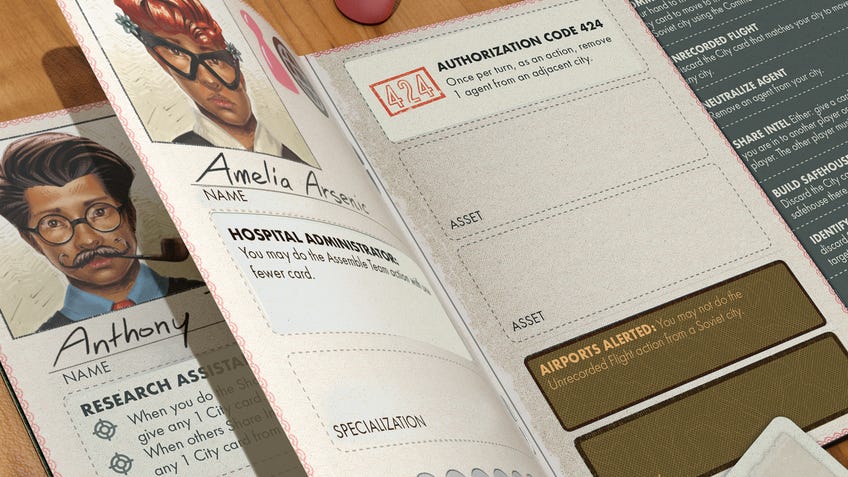
Season 0’s most inspired and effective blend of theme with gameplay is in players’ aliases. The game box includes four real passports (a pleasure to flick through, thanks to leatherette covers), which players use to create three personas aligned with the Allied, Soviet and neutral locations on the board. These characters are visually more customisable than Season 2’s fixed mugshots - playing dress-up with a bunch of bald heads and disguise stickers is exactly as much fun as it sounds. They also serve the gameplay beautifully, offering players different benefits depending on their alias’ unique ability stickers and current alliance. Combined with the demands of the different objectives of each month, the aliases offer up the most dynamic challenge and strategy of any Pandemic game to date - and the puzzle least likely to feel quickly ‘solvable’ by veterans.
The writing is seeped in pastiche and tropes, but that doesn’t stop the story from throwing up some genuine surprises.
The spy-thriller plot crafted by Daviau and Leacock (along with co-story writer Justin Kemppainen) gleefully pays homage to genre classics off the bat, with a rogue US agent set up as a secondary objective for players to pursue and players reporting back to their M-like CIA handler, Cooper, for a debrief between each mission. The writing is knowingly seeped in pastiche and familiar tropes - some elements are more le Carré, others Fleming-esque - but that doesn’t stop the story from throwing up some genuine surprises and twists as it unfolds.
Many of those surprises come at the control of the players themselves. Season 0 takes the player-influenced stories of Season 1 and 2 to new heights, introducing a dedicated book of events - similar to Choose Your Own Adventure books or the Book of Scripts in the excellent This War of Mine board game - for players to read numbered entries from. Different outcomes can occur depending on which objectives are completed or failed - and to what degree or when - as well as more explicit choices made by the players as a group. These decisions and results can have lasting effects on the world and plot, far more so than the previous Pandemic Legacy games. Central story beats still proceed on a relatively fixed timeline (as before, players get two shots at completing a month before automatically advancing), but the details of the story and entire plot threads can differ depending on the players. Dramatic moments land with an appropriate shock value, while tough decisions feel exactly that - particularly when the game steps up the real, tangible repercussions.
Season 0 represents the most accomplished storytelling in the Pandemic Legacy series, comfortably placing it in the top tier of narrative board game experiences.
While Pandemic Legacy’s narrative elements have never been quite as revolutionary as its gameplay leaps, Season 0 represents the most accomplished storytelling in the series, comfortably placing it in the top tier of narrative board game experiences. If you’ve played seasons 1 and 2, there are enough nods to the wider Pandemic-verse to make this a fitting final bow to neatly tie the trilogy together - including some reveals that had me practically jumping out of my seat with the implications for the previous games. Season 0 can be played as the first in the trilogy, but its bringing together of general gameplay improvements over its predecessors with the payoff of past/future moments means that starting here might make it harder to go back (or forward?) to Season 1 afterward.
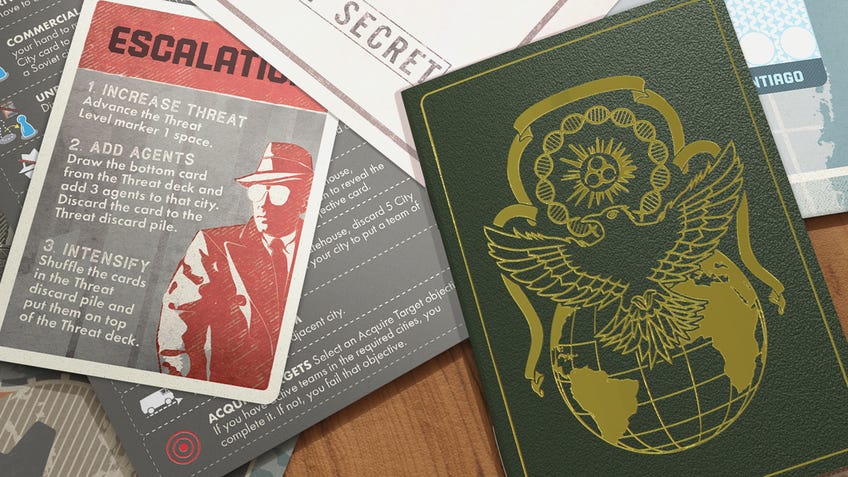
It’s not always as simple as choosing between option CIA and option KGB in-between missions, either. Many of the hardest decisions are made on the board, as the players find themselves choosing between progressing the hunt for MEDUSA or the search for missing Agent Sabik. (Along with bigger and more demanding tasks later on.) As in previous Pandemic Legacy titles, there are multiple objectives each month; while all are possible to complete, sometimes you’ll find yourself having to prioritise one, risking failure in the other.
It’s not always as simple as choosing between option CIA and option KGB.
Things are tricky, but never unfair; while the luck of the draw still applies as you search for the cards needed to complete certain actions, and occasionally you’ll have to take a last-turn gamble, Season 0 is more consistent in its difficulty than Season 2. I played the entire campaign with one other person who has played all of the Pandemic and Pandemic Legacy games, and we only played a second game in one month, August - and even that was largely due to the very unfortunate drawing of two escalation cards (Season 0’s equivalent to epidemics) on the same turn, one turn away from completing an objective for a partial success. (We successfully completed all objectives in seven of the 12, including the final chapter.)
It helps that Leacock and Daviau have introduced a third level of completion - adequate - which can be achieved by succeeding in some, but not all, objectives. An adequate grade advances the game to the next month in the same way as a success, but grants a level of additional funding - in the form of extra helpful event cards in the deck - like a failure. It’s well-judged as a balancing mechanism, smoothing the frustration of having to repeat multiple months as the result of things spinning out of control. It also means not having a second chance to complete certain objectives if you finish at least one or two the first time around, leading to enjoyable tension over where to focus your efforts.
One major gameplay reveal generated a table-wide gasp, while a story twist in the final games lands a five-year, three-game run-up flawlessly.
As you’d hope, Season 0 takes both gameplay and story in some interesting directions by the time you pop the box lid back on for good. If you’re coming to this after the two previous games, you might feel a sense of familiarity - there’s once again the now-typical eight boxes and multiple sheets of stickers to crack open when instructed, containing a combination of new gameplay rules, components and the like. Season 0 still sticks them where it counts, though; one major gameplay reveal generated a table-wide gasp and that giddy feeling of uncovering a secret hiding in plain sight, while a story twist in the final games lands a five-year, three-game run-up flawlessly.
Whether because this is the third Pandemic Legacy game or the number of innovative legacy games that have followed in its wake, I found myself less surprised than during Season 1 and 2 but ultimately just as satisfied - maybe even more so - seeing everything come together in a fitting finale.
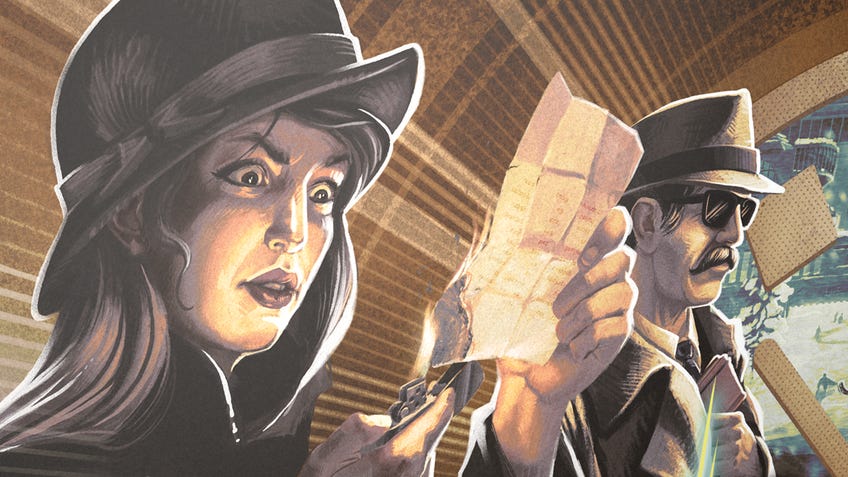
Season 0 is two of the tabletop’s greatest designers seeing off one of board gaming’s best series with a celebration of everything that has made it unforgettable.
If Season 1 felt like Daviau and Leacock’s dazzlingly fresh debut and Season 2 saw the designers overcome difficult second album syndrome with an experimental masterpiece, Season 0 shows Pandemic Legacy both returning to its origins and showing how far it's come. There’s no shortage of invention and creativity here, but it’s more of a controlled and consistent recomposition - a diligent effort to build out the world and lore of the series rather than completely redefine it.
Season 0 is two of the tabletop’s greatest designers seeing off one of board gaming’s best series with a celebration of everything that has made it unforgettable, and going out on a high. If you’re already invested in Pandemic Legacy, this won’t disappoint you. If you’re yet to embark on its journey, make this your final destination - and know that you’re in for a hell of a trip.
